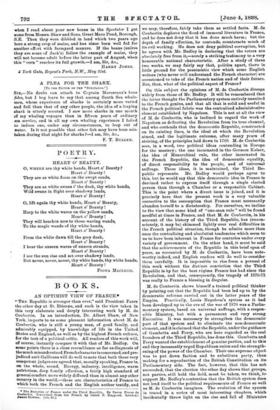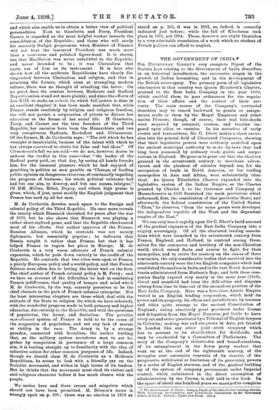BOOKS.
AN OPTIMIST VIEW OF FRANCE.*
"THE Republic is stronger than ever," said President Faure the other day at St. Etienne, and such is the view taken in this very elaborate and deeply interesting work by M. de Coubertin. In an introduction, Dr. Albert Shaw, of New "York, imparts to us some pleasant information about M. de Coubertin, who is still a young man, of good family, and admirably equipped, by knowledge of life in the United States and England, as well as by the highest French culture, for the task of a political critic. All readers of this work will, of course, instantly compare it with that of Mr. Bodley. On some points there is a close resemblance so far as diagnosis of the much misunderstood French character is concerned, and pre- judiced anti-Gallicans will do well to note that both these very competent judges are agreed that, morally speaking, France is, on the whole, sound. Energy, industry, intelligence, warm patriotism, deep family affection, a fairly high standard of general comfort more widely diffused than in almost any other country in the world,—these are characteristics of France to which both the French and the English author testify, and • The Evolution of Prance under the Third Republic. By Baron Pierre de Oonbertin. Translated from the French by Isabel F. Hapguod. London: James Bowden. (102.6d.)
we may, therefore, fairly take them as settled facts. M- de Conbertin deplores the flood of immoral literature in France, and he does not deny that it has done much harm ; but the depth of family affection, he contends, counteracts much of its evil working. He does not deny political corruption, but he agrees with Mr. Bodley in declaring that the voters are absolutely free from it,—surely a striking testimony to a very honourable national characteristic. After a study of these two works, we may fairly say that, politics apart, there is little ground for the pessimistic view which some English writers (who never will understand the French character) are accustomed to take of the French nation and of their future. But, then, what of the political aspect of France ?
On this subject the opinions of M. de Coubertin diverge widely from those of Mr. Bodley. It will be remembered that the latter thought the Parliamentary system entirely unsuited to the French genius, and that all that is solid and useful in the French political fabric was the centralised administrative element established by Napoleon. This is not at all the view of M. de Coubertin, who is inclined to regard the work of Napoleon as deflecting the Revolution from its true channel, and who contends that the democratic Republic, constructed on its existing lines, is the ideal at which the Revolution aimed, and the legitimate outcome, after many years of striving, of the principles laid down in 1789. M. de Coubertin sees, in a word, two political ideas contending in Europe for the mastery ; the one incarnated in the German Kaiser,, the idea of Monarchical rule, the other incarnated in the French Republic, the idea of democratic equality,, of direct responsibility to the people, and of universal suffrage. These ideas, it is maintained, the Third Re- public represents. Mr. Bodley would perhaps agree to this, but he would say that this democratic idea in France is. destined rather to express itself through a single elected person than through a Chamber or a responsible Cabinet. Thisis the point where a direct issue is joined, and it is. precisely here that the present work is a very valuable- corrective to the assumption that France must necessarily abandon herself to a dictatorship. For ourselves, we incline to the view that some kind of "one-man rule" will be found needful at times in France, and that M. de Coubertin, in his account of the history of the Third Republic, has (uncon- sciously, it may be) skimmed lightly over real difficulties in the French political situation, though he admits more than once the centralising and absolutist tendencies which seem to. us to have been inherent in France for centuries under every variety of government. On the other hand, it must be said that the achievements of the Republic in this brief span of years, as recounted by M. de Coubertin, have been note- worthy indeed, and English readers will do well to consider. them carefully. It is impossible to rise from a perusal of this work without the distinct conviction that the Third. Republic is by far the best regime France has had since the. Revolution, and that, consequently, the tragedy of 1870.71 was really to France a blessing in disguise.
M. de Coubertin shows himself a trained political thinker by pointing out that the Republic had been led up to by the democratic reforms carried out in the latter years of the Empire. Practically, Louis Napoleon's system as it ha& been developed up to the eve of the war of 1870 was a Parlia- mentary system, based on universal suffrage, with a respon- sible Ministry, but with a permanent and very strong Executive. It was necessary to strengthen the democratic part of that system and to eliminate the non-democratic element, and it is claimed that the Republic, under the guidance of G'ambetta and Ferry, who are here regarded as the real founders of the Third Republic, has done this. Gambetta, and Ferry wanted the establishment of genuine parties, and to this. end they incessantly urged Republican union and the strength- ening of the power of the Chamber. Their one supreme object was to put down faction and to substitute party, thus. making for a reproduction of the British Constitution on its. Parliamentary side. The fact, however, that this has not succeeded, that the election the other day shows that groups,, not parties, still hold the field, must be taken, we think, to. support Mr. Bodley's contention that the British system does. not lend itself to the political requirements of France so well as M. de Coubertin imagines. The evolution of the system is traced in a series of most interesting chapters, which incidentally throw light on the rise and fall of Ministries and which also enable us to obtain a better view of political personalities. Next to Gambetta and Ferry, President Carnot is regarded as the most helpful worker towards the consolidation of the Republic ; and those who will study his masterly Budget programme whea Minister of Finance will see that the lamented President was much more than a courteous and polished figure-head. It is shown, too, that Macliahon was never unfaithful to the Republic, and never intended to be ; it was Clericalism that made use of him as its instrument. It is here also shown how all the moderate Republicans have clearly dis- tinguished between Clericalism and religion, and that in attacking the former, which aims at strangling modern culture, there was no thought of attacking the latter. On no point does the contest between Moderate and Radical Republicanism stand out more plainly; and since the efforts of Leo XIII to make an entente (to which full justice is done in an excellent chapter) it has been made manifest that, while France stands resolutely by religion and religious freedom, she will not permit a corporation of priests to dictate her education or the forms of her social life. If Gambetta, Ferry, and Carnot are the true founders of the Third Republic, her enemies have been the Monarchists and two very conspicuous Radicals, Rochefort and Clemenceau. Of the former, M. de Coubertin says : "The evil which he has wrought is incalculable, because of the talent with which he has always contrived to clothe his false and bad ideas." Of Clemen.ceau's fall we are told—we do not, however, desire to endorse the verdict in this case—that "the leader of the Radical party paid, on that day, by seeing all hands forsake him, for the immoral pleasure which he had enjoyed of gambling in politics as men gamble on 'Change, of feeding public opinion on dangerous chimeras, of continually impeding the progress of business ; his whole political existence had had but one aim, to destroy, and but one means, intrigue." Of MM. Maine, Ribot, Dupuy, and others high praise is given, which, if just, must modify the English judgment that France has used up all her men.
M. de Conbertin devotes much space to the foreign and colonial policy of the Third Republic. He once more reveals the enmity which Bismarck cherished for years after the war of 1870, but he also shows that Bismarck was playing a rather short-sighted game, and that the Republic checkmated most of his efforts. Our author approves of the Franco- Russian Alliance, which he contends was not merely diplomatic, but essentially popular ; he indicates that Russia sought it rather than France, but that it has helped France to regain her place in Europe. M. de Coubertin is a very warm advocate of French colonial expansion, which he puts down entirely to the credit of the Republic. He contends that two roles were open to France, a purely European policy and a world-policy, and that French failures were often doe to letting the latter wait on the first. The chief author of French colonial policy is M. Ferry ; and we have an account of the difficulties he had in combating French indifference, that quality of temper and mind which M. de Conbertin, by the way, scarcely perceives to be the chief obstacle in the path of French colonial enterprise. Not the least interesting chapters are those which deal with the attitude of the State to religion (to which we have referred), with the wonderful progress made in both primary and higher education, due entirely to the Republic, and with the questions of population, the Army, and Socialism. The peculiar morcellement system of France is held to be the cause of the stagnation of population, and not any lack of morale or virility in the race. The Army is, by a strange paradox, connected with Socialism, the author holding that, as the military system accustoms men to act to- gether by compulsion in pursuance of a large common aim, it is leading straight up to familiarity with the idea of collective action for other common purposes of life. Indeed, though we should class M. de Conbertin as a Moderate Republican, he seems to look with a friendly eye on the Socialist movement, and writes in high terms of its leaders. But he thinks that the movement must shed its violent and anti-religious character before it has much chance with the people.
We notice here and there errors and misprints which should not have been permitted. M. Brisson's name is wrongly spelt on p. 199; there was no election in 1878 as stated on p. 205, it was in 1881, as, indeed, is correctly indicated just before ; while the fall of Khartoum took place in 1885. not 1884. These, however, are alight blemishes in a very admirable translation of a work which no student of French politics can afford to neglect.



































 Previous page
Previous page